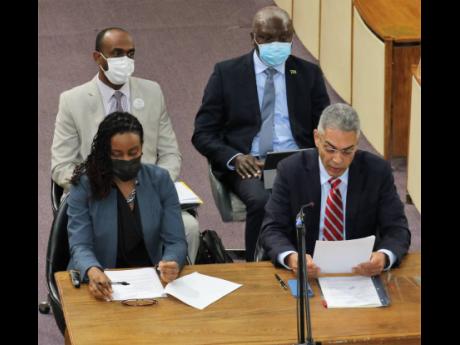Inflation greatest enemy of J’cans – Byles
Governor of the Bank of Jamaica (BOJ), Richard Byles, has described inflation as the worst enemy of Jamaican businesses and declared the bank’s commitment to wage a vigorous fight against it.
His comments came while making his first report to a sitting of the Standing Finance Committee of Parliament, as he is now required to do under the Bank of Jamaica Amendment Act 2020, which gives the central bank full independence to craft policy, based on its priorities for the monetary system. The law dictates that the BOJ governor report to Parliament two times per year.
Byles’ remarks on inflation came during his response to a question from Opposition Leader Mark Golding on the issue of dual currency.
“Inflation is the worst enemy of Jamaicans. For a businessman, interest rates can go up today and come down tomorrow. For the Jamaican, inflation goes up, it’s not coming down. He has to live with that inflation (and) that economic base has been eroded by inflation. So if inflation even went from eight (per cent) to two (per cent), still he has to hug up that eight and that two.
“So to me, defending the Jamaican population against inflation surpasses the secular interest of whether it is this business community, that business community, a mortgagee or whatever. Generally, the three million Jamaicans, everyone of us are affected in the same way by inflation, and so it is our mandate to fight inflation and I take it very seriously,” he declared.
Earlier in his presentation, Byles had pointed out that the recent inflation performance and outlook between August and October 2021 had caught his attention, as it tended to be above the upper limit of the bank’s four to six per cent target range. He cited the large increases in international commodity and shipping prices as the main reason for this high inflation rate and spelt out its strategies for coping.
“While the Bank of Jamaica has no control over these external prices, the bank has some control over the second-round effects of these increases and has implemented a suite of policy measures aimed at managing inflation expectations and returning inflation to the target in the shortest possible time.
“These policy actions include, one, increases in the bank’s policy rate from the record low of 0.5 per cent to its current level of two per cent; two, measures to contain Jamaica dollar liquidity expansion; and three, while not targeting a specific rate, the bank seeks to ensure that movements in the exchange rate do not threaten the inflation target.”
Byles gave notice that the Bank of Jamaica is also prepared to consider further increasing its policy rate and could intensify the accompanying measures. The bank’s policy actions, he said, have been designed to limit the second-round effects of the shocks and to guide inflation back within the target range over the next two years. These measures will cause market-based interest rates to rise, which will make savings more attractive, relative to spending and borrowing in Jamaican dollars to be more expensive.
They are intended to temper the demand for foreign currency and moderate the pace of depreciation in the exchange rate and will also reduce demand in the economy and with it, the ability of businesses to pass on price increases to consumers.

